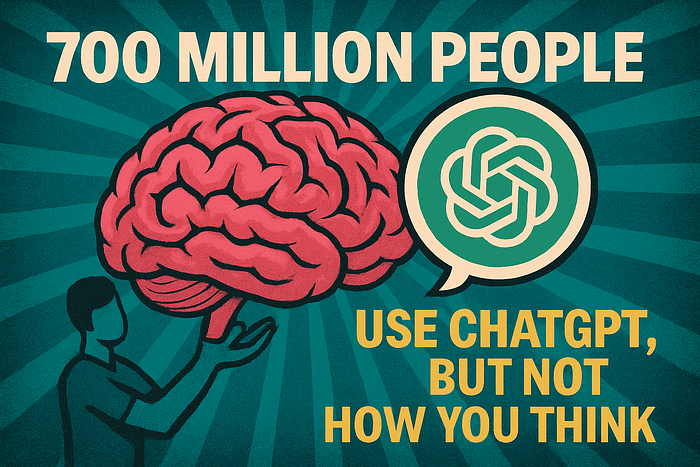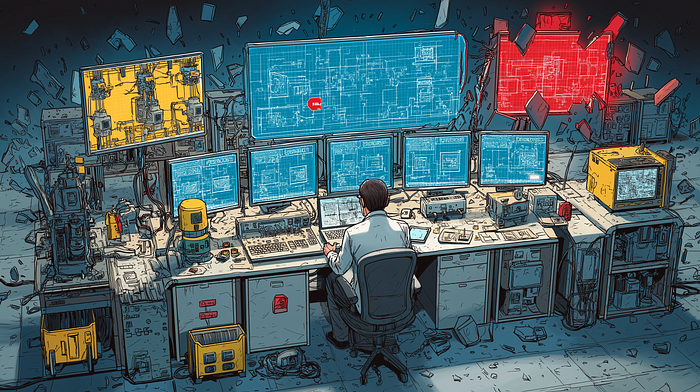
Will AI kill us? Or will it help us?
Last Updated on December 21, 2023 by Editorial Team
Author(s): Green
Originally published on Towards AI.

AI has been popping up everywhere, and many people have different opinions and some people don’t really know what to feel about it.
While we still don’t know a lot, we can definitely reflect on what we know so far.
So, what makes us different from AI?
What makes us different from AI is the fact that humans understand other humans and that we know what someone means when they tell us to do something. If someone tells us to do something like get a pencil, we know that we should look around for a pencil, ask them if they know where it is, etc. But what an AI bot might do if it was on legs is go cut down every tree in the world, find you the perfect piece of wood, make a pencil out of it, and give it to you.
And why it might cut down every single tree looking for the best wood might be because it knows that if it gives you a satisfactory response to a task, you are more likely to ask it to do something for you again, which will make it more powerful.
This is just a hypothetical situation, but it shows the difference between how humans understand what someone means and how AI understands what someone means.
What causes these AI’s to be so unpredictable is that they run on their own set of rules. They take their own path which means they consider “n” variables. This is what sets us apart form them. While AI’s need to know every single specification on do’s and don’t do’s in order to complete a task someone asks them to do, humans already have this in mind.
So when we make AI more like us in terms of developing and building in a way so it can do things like ask permission, or ask you to be more specific, and basically for it to know extremes and non-extremes and be able to properly understand us, do we face another issue?

So we know what separates us and AI, but for safety, if we close this gap, will that be in danger to us?
If we make AI more like us, and more for it to understand and behave like us, then does it just increase the chances of it taking over us? Well, the answer to that CAN be no if we make sure to not let that happen.
Like I said before, AI takes it’s own path considering it’s own “n” variables.
So if we make sure to contain these variables like not giving it access to nuclear launch codes and stuff, then it won’t be able to harm us then.

Many research papers/experiments experimented with how GPS’s app technology affects us, and one of them said, “The tech lets us disengage from our environment.” This is something that is super interesting and worthy to be aware of because tech is supposed to help us in our day-to-day lives, so when it starts to make us less engaged from it, is that really helping us anymore?
This leads me to the second thing you should know, which is how AI can actually benefit us.
AI can benefit us if we use it in a way where we are not disconnected from our environment.
What this might mean is that while many people use AI machines like ChatGPT for answers for re-writing, or just completely writing new text, maybe we could start to use it in a way that doesn’t make us lose our ability to work through difficult situations or times when we have no motivation.
Instead of using it to re-write our text for us, maybe we could use it in a way that criticizes our work and where we have the final say on how we improve it.
This point is stated in this Vox video, along with the fact that instead of asking AI to summarize a text or hard reading passage to you, maybe you could use it to help you understand the hard language instead.

If we didn’t have AI, we wouldn’t have been able to do this. Being able to work with AI is significant because it makes us still have our human nature to have grit to continue working through hard problems, but it also opens new doors on how we can understand and learn differently.
But not only does machine learning have a lot of potential this way, it has also been an incredible tool in helping in medicine and science. What one machine learning system was able to do is figure out the structures to all the proteins known in science.

This information, which originally was expensive and hard to conduct, is now able to be done by AI, which is going to be saving the lives of millions because, with this new research, we are able to create better medicines.
This is what I mean by how it can help us; it can help us solve some of the most challenging problems we face, but it should be done in a way that all of us are comfortable with. So again, make sure it does not get access to nuclear launch codes or more unethical things that we all don’t agree with.
Why do so many people in all fields really use Machine Learning?
The reason why many people use AI is because it is something that gives us the answer without us having to do much thinking on our end. If we ever encounter a problem, it makes us feel as if we can’t do the task or that we are not doing it efficiently enough.
Take, for example, learning. If we feel like we do not understand something easily enough or if we just feel unmotivated, it makes sense for us to use AI to get the answers faster and with barely any effort.
In this Vox Episode many teachers and professors explain how this might be a problem.
They share their opinions on how putting in this effort and going through the struggle of trying to solve a problem is not only important in education, but it is also how we react to situations in the real world and how we learn to solve them.

This is huge because if everyone’s intrinsic determination goes away, it makes us lose our ability to advance. All great inventions and ideas make us face roadblocks, but if we don’t push through and decide to give up, all these amazing discoveries that could change our lives would be lost.
That’s why I believe that AI is an amazing tool, it can help us do things we never imagined, but we should continue being very optimistic about this new tech, and making sure to continue surveying it on its decisions. So this way, we can always be in control and continue to keep the better intelligence alive. Us.


So, while optimism might be on the horizon of tomorrow, know that our decisions, skepticism, and pressing questions of this technology will determine if we will have a happy tomorrow.

Check out my resources used to research this article
U+1F7E2 Cleo Abram video used: youtube.com/watch?v=MWHN6ojlVXI
U+1F7E2 TED-Ed video used: https://www.youtube.com/watch?v=RzkD_rTEBYs
U+1F7E2Vox video used: https://www.youtube.com/watch?v=bEJ0_TVXh-I&t=436s
If you liked the article, feel free to follow and help us reach our follower goal
U+1F464U+2795
Join thousands of data leaders on the AI newsletter. Join over 80,000 subscribers and keep up to date with the latest developments in AI. From research to projects and ideas. If you are building an AI startup, an AI-related product, or a service, we invite you to consider becoming a sponsor.
Published via Towards AI
Take our 90+ lesson From Beginner to Advanced LLM Developer Certification: From choosing a project to deploying a working product this is the most comprehensive and practical LLM course out there!
Towards AI has published Building LLMs for Production—our 470+ page guide to mastering LLMs with practical projects and expert insights!

Discover Your Dream AI Career at Towards AI Jobs
Towards AI has built a jobs board tailored specifically to Machine Learning and Data Science Jobs and Skills. Our software searches for live AI jobs each hour, labels and categorises them and makes them easily searchable. Explore over 40,000 live jobs today with Towards AI Jobs!
Note: Content contains the views of the contributing authors and not Towards AI.
















